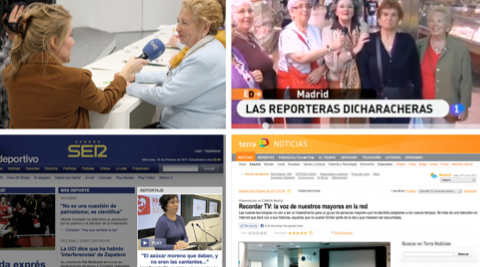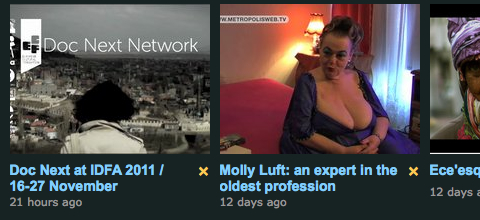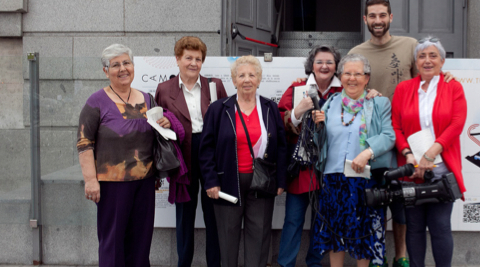Taller de iniciación al documental DIY
by rubendiaz
Qué:
Taller de iniciación al documental DIY
Dirigido a todas y todos los que tengan inquietud por el nuevo documental y quieran desarrollar una idea desde un punto de vista personal para ponerla en imágenes. Este taller pretende ser un espacio de aprendizaje, pero también de discusión y experimentación sobre cómo expresar en imágenes cuestiones de género.
Quién*:
Imparte el taller Virginia García del Pino (Barcelona, 1966), directora de cine de no ficción y directora de proyectos del Master de Documental Creativo de la UAB. Licenciada Bellas Artes, su producción como videoartista le acerca al género documental. Sus vídeos surgen de una tentativa de comprender el mundo desde una óptica menos dolorosa, gravitando alrededor de las convenciones sociales de la representación, y es, seguramente, en ese intento de comprensión donde suele optar por una contundente sencillez formal. Muestras de ello son Lo que tú dices que soy, Espacio Simétrico, Mi hermana y yo o Mari Carmen.
*Es una producción de ZEMOS98 con el apoyo de la red Doc Next, del programa Youth&Media de la European Cultural Foundation. Este taller cuenta con la colaboración del I+CAS del Ayuntamiento de Sevilla.
Cuándo:
del 29 de noviembre al 1 de diciembre, en horario de mañana.
Dónde:
I+CAS (c/ Torneo, 18 – Monasterio de San Clemente)
Cómo:
Las personas interesadas en participar en el taller, pueden solicitarlo rellenando este breve formulario de inscripción. El plazo terminará el 25 de noviembre a las 15h.
Por qué: Uno de los objetivos principales de la red Doc Next es recopilar documentos de jóvenes realizadores europeos. Lo importante de esta búsqueda son las historias que retratan realidades, por lo general, invisibles en los medios de comunicación dominantes. Por ello, el formato, la calidad o la técnica no son tan relevates como el relato, la biografía, la memoria.
Entre las actividades que ofrece nuestra red, encontramos la media collection, presentaciones y proyecciones, debates e investigaciones y talleres sobre el uso de los medios desde una perspectiva DIY.
Este taller de iniciación al documental DIY busca facilitar la expresión en imágenes en movimiento de esos relatos, biografías y memorias individuales y colectivas. La actitud DIY (Do It Yourself: Hazlo Tú Mismo), con esa contundente sencillez formal que expone Virginia, nos permite contar nuestra propia historia con sensibilidad y construir así nuestra propia visibilidad.
Proyección de cortos de la red Doc Next en el SEFF11
by rubendiaz
Esta tarde a las 19h 17.30h en el I+CAS proyectamos una selección de vídeos pertenecientes a la media collection de la red Doc Next.
Los vídeos que se proyectarán son los siguientes:
A Way by Sergey Kirasyan (Armenia)
Biżuteria Publiczna by Iwo Kondefer (Poland)
Bracia by Emi Mazurkiewicz (Poland)
Ece’esque by Bahar Demirkan, Okyar Igli, Hayati Kose and Morteza Moghaddam (Turkey)
Grown up at age of 11in Macedonia by Vladimir Tevcev (Macedonia)
Guilty until Proven Innocent by Danyal Laskar (UK)
Launderette by Bertie Telezynski and Alex Nevill (UK)
Lost in Translation by Akile Nazli Kaya (Turkey)
Sex Sense by José Manuel Borrego, José Manuel Expósito, Pedro Fernández, Rosario Fernández, Noelia Fernández, Belén Márquez, José Antonio Márquez, Iván Ruiz Vergara and Pablo Domínguez (Spain)
The last communist in Berlin by Robin Meurer (Germany)
TRON by Felipe G. Gil (Spain)
Zero Point by Gjorgje Jovanovic (Macedonia)
¿Nos vemos allí?
“Zombie Girl: The Movie”
by rubendiaz
“Zombie Girl: The Movie” is a feature-length documentary covering the time it took 12-year-old Austin, Texas, filmmaker Emily Hagins to make her zombie movie “Pathogen”. The film also explores the advancements in technology that have made it possible for so many young people to shoot and edit their own movies.
“El sexo sentido” has been awarded PREMIO VISIBILIDART
by rubendiaz
“El sexo sentido” (Sex Sense) is a short documentary about youth, sex, love and fears. This video belongs to Doc Next Network media collection and has been made during the audiovisual workshop ZEMOS98 produced at El Viso del Alcor (Seville, Spain), in the IES Profesor Juan Bautista (June 2011).
We’d like to congratulate the media makers José Manuel Borrego, José Manuel Expósito, Pedro Fernández, Rosario Fernández, Noelia Fernández, Belén Márquez, José Antonio Márquez, Iván Ruiz Vergara, together with the coordination of Pablo Domínguez and Rubén Díaz (both members of ZEMOS98) because of the VISIBILIDART 2011 prize, given by COLEGADES (a LGBT association located in Cádiz, Spain).
The VISIBILIDART prize awards those cultural initiatives that make efforts to eradicate homophobia and to promote democratic values.
“El sexo sentido” has aroused great interest as it was broadcasted in the Spanish National TV (TVE) programme “Cámara Abierta 2.0”:
Recordar.TV, listening to our elders
by rubendiaz
Recordar TV (Remember TV) is an internet television built up from the perspective of the elderly. It aims to encourage digital literacy among this collective, promote their stories, which do not often take part on the net, and also help with the local issues that could be of public interest on the internet. This is an internet television project, therefore we will not only publish videos, we will take advantage as well of the multimedia languages that are possible on the web.
You can find an English version of the project’s dossier here
The elderly of our society have many things to tell us and Recordar TV has a vocation for listening to them. We would like to encourage those stories which are not usually present on the web and look after local worries subject to public interest and also being creative at the same time. And we would like to do it through an internet television. But not just any television on the internet, but one which is made from the perspective of the elderly. For and by them. And, in that way, help out with the digital literacy of this wide social group, which is highly relevant nowadays in the current paradigm in which life expectancy keeps increasing.

The lack of communication of a society with their elders usually is not an issue of age difference, neither it is due to diverse generations not understanding one another. Sometimes it happens that the tools we use to do it are just different. Because growing older not necessarily means stop being young. That is the reason why we want to share the tools that exist nowadays with people that did not have, for whatever reason, the chance to get to know or handle them with ease to make them part of their everyday life.
We are going to explore the lands where languages get mixed up, where prejudices vanish away, where lives cross one another. We are going to play again.
Because it is never too late to learn. And it does not matter how much you know, but how willing you are to keep learning.





